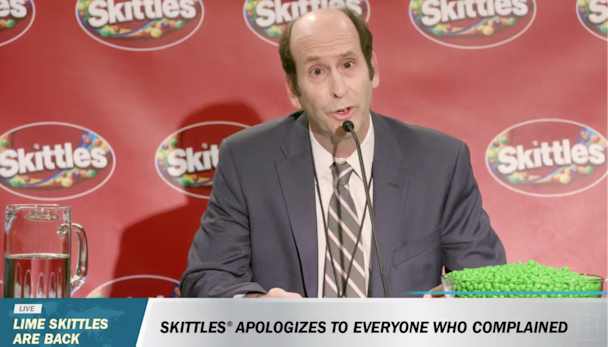Brave Brands awards: Why Skittles apologized to 138,880 online lime flavor haters
Skittles turned its online hate into a campaign that grew its X brand mention by over 400%.

Apologize The Rainbow campaign by DDB Chicago and DDB New York
Each year, the International ANDY Awards team up with the Advertising Club of New York hold the Brave Brands awards, celebrating brands that have undertaken bold, risk-taking projects alongside their agency partners. This year, the honor was bestowed on Skittles and its agency of record DDB for its clever effort to turn customer backlash on its head to help promote the relaunch of its lime flavor.
Nine years ago, Skittles caused outrage when it replaced its lime-flavored candy with a lookaline green apple flavor. In 2021, it brought back lime Skittles in the form of a dedicated all-lime package.
But the brand wanted to go a step farther and embrace consumers' longstanding love of lime. That's when the Mars-owned candy brand tasked DDB Chicago and DDB New York (now adam&eveDDB) to create a launch campaign in which the brand would reintroduce the beloved flavor. The agency pitched a simple, straightforward idea: accept the hate, and apologize to everyone who complained.
Advertisement
The 'Apologize The Rainbow' campaign was a series of 138,880 live personal apologies posted on Twitch, X (formally Twitter) and on billboards in Times Square. All 138,880 online haters also received a free pack of lime Skittles.
The online lime Skittles conversation grew 162% year-on-year and on X total brand mentions were up +400% in the campaign’s first week. The campaign resulted in a 7.4% sales lift against a backdrop of a 15.2% decrease in the distribution of Skittles.
Both Skittles and its agency claim the idea came organically, Ro Cheng who is the fruity director at Mars Wrigley North America tells The Drum: “We saw the timely opportunity to leverage this cultural and social phenomenon to reignite relevancy with Gen Z by addressing a consumer tension head-on.”
Advertisement
Many brands have given corporate apologies but what made this campaign break through was the approach of personalised apologies. Colin Selikow, global executive creative director at DDB Chicago, says everyone is used to the “formula” of a corporate apology claiming they often feel “shallow, impersonal and performative” – “That seemed like the perfect vehicle to mess with.”
One challenge when conceptualizing the campaign was how to engage and entertain a broader audience and not just the “lime-loving” customers.
“Our vocal lime fans were certainly a sizable group, but for this campaign to succeed it obviously needed to reach and appeal to an audience far beyond that group alone,” Cheng says. “Early on, we established a rule of thumb that even if you didn’t know about all the lime ‘controversy’ and conversation, the idea should still be noticeable, memorable, and easily understood.”
Suggested newsletters for you
The livestream element was one way Skittles managed to cut through with a broader audience.
“The live element was such a huge part of the authenticity of this campaign. And people respond to authenticity. They expect it from their brands. The honesty, openness and culpability we demonstrated really hit with people,” Selikow says.
The second challenge was how to show authenticity. “At its core, this was a true corporate apology where SKITTLES, a storied confectionary brand, was being asked to call out their wrongs and face them head on,” Selikow says. He claims the authenticity challenge was overcome by the agency/brand relationship and the dedication from Skittles to correctly execute the campaign.
The idea of publicizing complaints could have been risky for Skittles if the creative execution didn’t land and Selikow admits there was some pushback. Cheng says that at Skittles the braver the brand is the more effective it is.
“People really respond to us when we take on things no other brand would touch. A big game ad that’s a Broadway musical - sure. An ad for one person - absolutely. A corporate apology to every single person who ever complained online – bingo,” she says.
Selkow adds: “There is actually a really smart logic to highlighting all that negativity - nothing shows the love for something like the heated passion seen when it’s taken away.”
In terms of campaign learnings, Cheng says it taught her honesty resonates with customers. “People expect honesty and authenticity from their brand, not hollow corporate gestures. The positive response we received from actually acknowledging the impact of the flavor change and our passionate consumers really proves this out,” she says.

